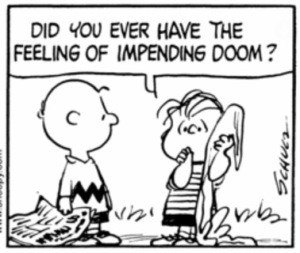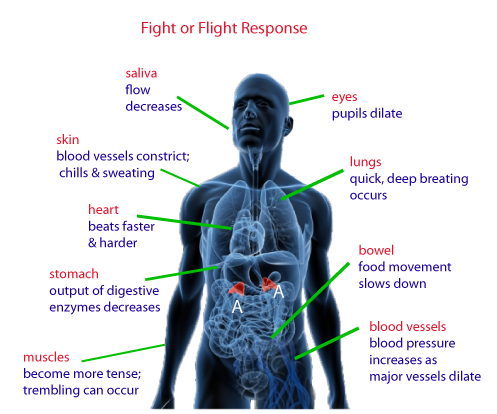
April is Stress Awareness Month. Not surprisingly, stress has mostly likely been in existence since the beginning of time. However, it was not until the early 1920s when a neurologist Walter Cannon began to recognize that 'stressors' could affect both our emotional and physical well-being.
He was the first to describe our 'fight or flight' response in times of feeling threatened. The actual word 'stress' was coined later in the 1930s by Hans Selye, a physician, who noticed his patients in the hospital looked ill due to being under physical stress.

Beginning in the 1950s, Seyle wrote a book entitled, TheStress of Life, as a way to communicate his concepts to the American population. So by the 1960s, academics and researchers began to adopt his concepts and pursued efforts to better understand them.
During the Vietnam War, stress became linked to men's experience post war, and it was at that time that the Post Traumatic Stress Disorder also known as PTSD was coined.

In spite of obvious changes in the behaviors of the soldiers returning from war, no one, no institution owned up to what was happening. Around this time, stress was a term reserved predominantly for men.
Women and communities of color, in particular African-Americans, were not considered to have stress due to notions of being taken care of, thereby preventing experience with stress contrary to men who had to provide for their families and go to war. But by the 1990s, the use of stress was ubiquitous in American culture.
So what is stress? According the Centers of Disease Control and Prevention (CDC), stress is "a condition that is often characterized by symptoms of physical or emotional tension." Symptoms can include increased blood pressure and increased heart rates, but there are many other bodily effects

that you may not notice or feel. When we are stressed, our brain sends a signal down our spinal cord to our adrenals located next to our kidneys causing the release of adrenaline. Adrenaline increases our heart rate.
The brain also signals for cortisol to be released from the adrenals which increases our blood pressure. These mechanisms are helpful to us in moments of stress, and allow us to react quickly and efficiently. However, once this happens blood flow to other parts of body such as our gut can also be turned off. This can be dangerous to the body if you experience stress for long periods of time.
The good news is that not all stress is negative. In fact, stress can be considered positive, also referred to as eustress, and is a form of excitement in which we feel we have some level of control over.
We usually experience positive stress during happy occasions or during exams. It helps with development, learning, and even bonding with others. It also helps motivate us to achieve our goals. With positive stress, our response fortunately turns off quickly.

Usually it is ones ability to capitalize on the support of family, friends, and colleagues that determines how quickly one can deal with and move past stress.
But what happens when "the off" switch does not work so well. This can lead to chronic or tolerable stress and eventually toxic stress. Chronic stress is probably what many of us NYers would say we experience daily as a result of the fast pace of living.
Tolerable stress typically is a response to more severe stressors like the death of a loved one or a natural disaster such as Hurricane Sandy or 9/11. This type of stress lingers longer than positive stress, however, like positive stress can be alleviated over time usually with the support from caring relationships and effective coping skills.
The worst type of stress is toxic stress. There is a growing body of research about the bad effects of constantly elevated levels of cortisol levels and other biomarkers have on our health. These sustained effects are triggered by the root causes of disease related to poverty, hunger, violence, racism, unemployment, abuse, neglect, to name a few.
Many adults and, tragically, as well as children in our neighborhoods are inundated with these experiences and are suffering from unprecedented levels of toxic stress.
Toxic stress is especially problematic among our women, especially women of color. And if our women are affected then so will and are the children that they bring into this world.

Stressful events to the level of toxicity can actually change the brain architecture in the children as young as 18 months old, lead to problems with learning, emotional and mental health as well as problems with sleep, memory, and possible pregnancies with women.
So what can you do to deal with stress? For our communities that are suffering from aweful effects of toxic stress, the solution is focused on addressing those very social and economic factors that created the unhealthy living environments in the first place.
That can be achieved though strong coordination and collaboration among the community members suffering from the injustice, community based organizations, policymakers, and government officials.
For all types of stress, it is important to recognize that stress for one person can be different to the next. Which means what helps one person may or may not work for someone else. However, one good start when you recognize you are stressed is to talk with others; whether it is family, friends, or your healthcare provider.
Often times when we feel stressed we become silent for many reasons, and just figure we can deal with stress on our own. Often times, this is just not the case. In NYC, you can call for yourself or for a friend at 1800LifeNet 24 hours a day 7 days a week to speak to a trained mental health professional.
And nationally, you can call 1-800-273-TALK (8255) for support. Please share with this information with someone else you know that may be stressed. This is one of the ways we can best support each other and help turn the stress switch off.
Dr. Aletha Maybank is a pediatrician board certified in preventive medicine/public health. You learn more about her at www.dralethamaybank.com and follow her on Twitter at @DrAlethaMaybank.



